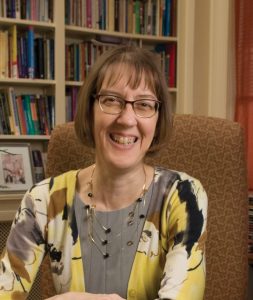Union Seminary awarded grant to map children’s faith formation
RICHMOND, Va. (October 30, 2018) – Union Presbyterian Seminary has been awarded a grant to develop a map to help churches find new ways to communicate the value of religious practices for children and families in a diverse and complicated world.
The daily lives of American children and families are significantly affected by ongoing cultural and institutional religion shifts. Technological developments, including the rising popularity of social media, smartphones, and digital gaming and entertainment, have encouraged new forms of social identity formation, most notably that of ‘networked individualism’. Religious participation has continued to decline in North America, leading to higher numbers of persons who describe themselves as ‘spiritual but not religious’ or who are identified by scholars as ‘religious but not affiliated’.

Dr. Karen-Marie Yust
“Our research will help congregations retool their approaches to faith formation in ways that address the challenges of contemporary family life and also offer ideas about how Christian spirituality can be more effectively presented in the public realm as a positive contribution to children’s well-being, potentially attracting non-affiliated families to participation in communities of faith,” said project director Karen-Marie Yust, Josiah P. and Anne Wilson Rowe Professor of Christian Education.
Scholars and reflective practitioners have noted the rising religious illiteracy and incoherent faith of families, even among households that are religiously affiliated, as well as the breakdown of denominational identities and the decline of middle-sized congregations as options for affiliation. Weak support from denominational offices and traditional publishing houses, the persistence of schooling models for children’s ministries, and a lack of parental confidence render current faith formation practices inadequate.
“If children learn religious stories are interesting but have no practical meaning in their life, they’ll outgrow them and seek other stories that are more helpful,” said Yust. “Our job is making those stories connect with their needs.”
The $303,716 Lilly Endowment grant will bring together children’s museum curators, developmental psychologists, experts in media studies and language development, publishers, and other non-church leaders to learn how they connect with children and families; and translate what they do into a religious faith setting.
“These non-church leaders have areas of expertise that religious leaders need to know about to meet people where they are in our busy, changing culture,” said Yust.
Over 27 months, the project will generate a summary list of typical beliefs and practices about children’s faith formation held by denominational staff members, congregational leaders, and parents; an updated description of childhood faith formation, drawing from contemporary theological and social science perspectives; a set of proposals for contextually engaging millennial and/or religiously-unaffiliated families; a bibliography of helpful contemporary resources for children’s and family faith formation that also identifies gaps that could be addressed through new resource development; and collect and showcase critical descriptions of experimental programs and alternative approaches that might serve as models or exemplars of effective children’s and family ministries.
“Union Presbyterian Seminary, through the legacy of the Presbyterian School of Christian Education, has long been a pioneer in researching and developing models for Christian Education that speak to and beyond the contexts of culture and church,” said Brian K. Blount, president of Union Presbyterian Seminary. “Dr. Yust follows in the footsteps of faculty members whose work has shaped the horizons for Christian Education. With her particular research foci on children’s spirituality, faith formation, and use of technology in the educational enterprise, she is uniquely poised to lead this effort and draw other scholars and practitioners into it.”
Participants include scholars and reflective practitioners whose current work and/or avocation focuses substantially on children’s faith formation from a variety of perspectives and locations. They represent different denominational traditions, including Baptist, Wesleyan, Presbyterian, Lutheran, Disciples of Christ, and United Church of Christ.
###
Contact:
Mike Frontiero
mfrontiero@upsem.edu
(804) 278-4279

